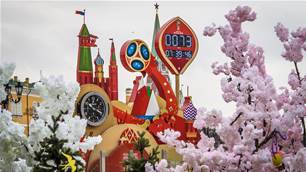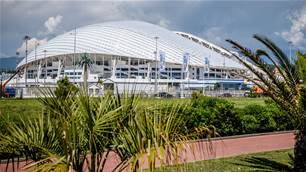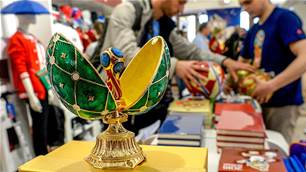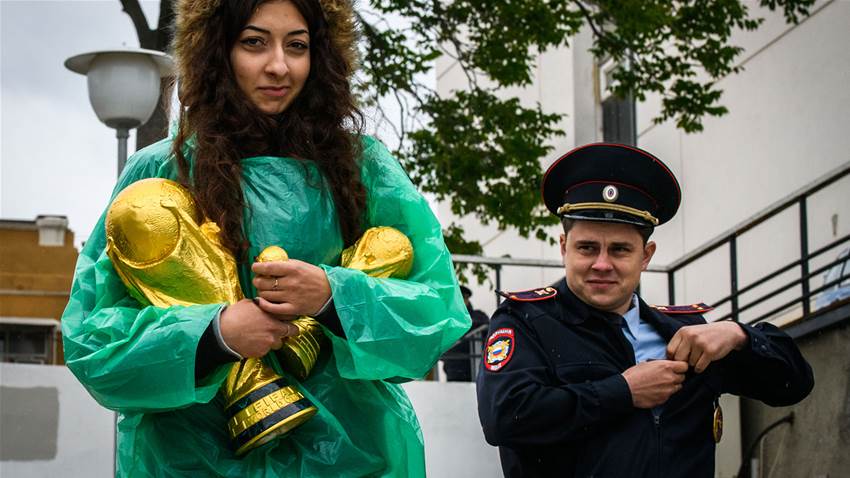The Russian national team’s victory over Egypt 3:1 and Uruguay’s victory over Saudi Arabia allowed the Russian team to qualify for the playoff stage of the 2018 World Cup, the first such achievement in the history of Russia.
The history of the World Cup began back in 1930 in Uruguay. The USSR national football team participated in the World Cup for the first time in 1958, when the tournament was being held in Sweden.
Having won the matches against the national teams of Poland and Finland, the Soviet national football team headed by the coach Gavriil Kachalin came through to the World Cup final to compete with the national teams of Brazil, England and Austria. During the group stage, the Soviet football team tied the game against the English team (2:2), won the game against the Austrian team (2:0) and lost to Brazil (0:2). After that, the Soviet team won the additional match against the national team of England (1:0) only to lose to Sweden’s national football team 0:2 in the quarterfinal.
In 1962, Chile was the World Cup host country. The Soviet team took a steady lead in the qualifying round, winning matches against the national teams of Norway and Turkey. In the final group stage, which began for the Soviet football players on May 31, the team won the game against Yugoslavia 2:0, tied the game against Colombia 4:4 and won the decisive game against Uruguay 2:1. In the quarterfinal, the Soviet team lost to the host country’s national team, the Chilean team, 2:1.
Ahead of the decisive matches of the 1966 World Cup, which was held in England, the USSR team was training under the guidance of coach Nikolai Morozov, who had never had any serious coaching experience before. Once again, the team successfully withstood the qualifying rounds by winning the games against the national teams of Wales, Greece and Denmark.
During the final group stage, the Soviet team won the games against the national team of North Korea 3:0, one of the tournament’s then favorites, Italy 1:0, and Chile 2:1. In the quarterfinals, the Soviet team won the match against the national team of Hungary 2:1. On July 25, the Soviet team lost 1:2 to the team from the Federal Republic of Germany in a semi-final match held in Liverpool. In the play off for the third place, USSR team lost to the Portugal’s football team 2:1.
In the 1970 World Cup, the Soviet team headed by Gavriil Kachalin withstood the qualifying round undefeated, thus proceeding to the final stage after winning matches against the national teams of Northern Ireland and Turkey.
On May 31, the USSR national team tied the opening match in Mexico against the host country’s national team 0:0. Then the Soviet football players won their second World Cup match against the Belgium team 4:1, and won the third against the national team of El Salvador 2:0. Having ranked first in its group, the Soviet team came through to the quarterfinal, only to lose to Uruguay’s national team 0:1.
The Soviet team missed the 1974 World Cup due to political reasons: the delegation from the USSR refused to come to Chile in order to attend the play-offs due to the situation in this South American country, which had experienced a military coup. In 1978, the team lost in the qualifying match to the Hungarian team.
In 1982, the Soviet national football team headed by coach Konstantin Beskov joined the list of World Cup participating teams after winning the first place in its qualifying group. The final stage, which was held in Spain, began with the Soviet team’s losing the game against the national team of Brazil 1:2. Then the Soviet players won the match against New Zealand 3:0 and tied the game with the Scottish football team 2:2, securing its place in the second group stage, where they defeated Belgium 1:0 and tied the game with Poland 0:0. However, the Polish team was the one to proceed to semifinals due to its better goal difference.
During the 1986 World Cup, the Soviet national football team headed by Valery Lobanovsky entered the list of participating teams, having ranked second in the group (Denmark’s team ranked first). The final stage of the World Cup began with the Soviet team’s winning the match against Hungary with a solid 6:0. Then the Soviet players tied the game with the French team 1:1 and won the match against the national team of Canada 2:0. During the extra time of the round of 16, the team lost to the Belgium national team 3:4.
The 1990 qualifiers were a success for the Soviet team, which ranked first in its group, leaving behind the national teams of Austria, Turkey, the German Democratic Republic and Iceland. In the finals hosted by Italy, however, the Soviet team lost two games against the teams from Romania and Argentina with the same score of 0:2. The major victory in the match against the national team of Cameroon (4:0) did not provide the necessary result, as the Soviet team did not have enough points to come through to the round of 16.
At the 1994 World Cup, which was held in the United States, the Russian national team came through to the final stage of the championship from the second place (the Greek national football team ranked first). During the preparations ahead of the World Cup, a group of leading football players made a demarche, refusing to play under the guidance of Pavel Sadyrin. A number of players (Igor Shalimov, Igor Dobrovolsky, Igor Kolyvanov, Sergei Kiryakov, Vasily Kulkov, Andrei Kanchelskis and Andrei Ivanov) did not participate in the tournament.
In the United States, the Russian national team under the guidance of Sadyrin failed to proceed further after losing to the national teams of Brazil (0:2) and Sweden (1:3). The resounding success of the team’s victory in the match against the Cameroon team (6:1) allowed Russian forward Oleg Salenko to become the best goalscorer of the tournament, together with Bulgarian player Hristo Stoichkov (6 goals). Moreover, Salenko became the only player in the history of the World Cup, who managed to score five goals in one match. This game against Cameroon, however, did not affect the Russian team’s tournament record – it failed to qualify for the round of 16.
In 1998, the Russian national team failed to join the list of teams participating in the FIFA World Cup, as it lost during the qualifications round.
During the 2002 World Cup held in South Korea and Japan, the team headed by Oleg Romantsev came through the qualifying round having ranked first. The team succeeded in the first match of the final group stage by winning a game against the Tunisian team 2:0. Then, the Russian team lost the match against the host country’s team, the Japanese football team, 0:1, to lose in the decisive match for the place in round of 16 against the national football team of Belgium (2:3).
The Russian national team did not participate in the 2006 and 2010 World Cups.
In 2014, under the guidance of Italian coach Fabio Capello, the team qualified for the final round of the tournament, which was held in Brazil, ranking first in the group F with 22 points scored in the course of 10 matches. During the final group stage, the team tied two matches (1:1 in the matches against the national teams of South Korea and Algeria), and lost 0:1 to the Belgian team and failed to come through to the World Cup playoffs.
In 2018, the Russian national team is participating in the World Cup as the host country’s team. In the tournament’s group stage, the team defeated Saudi Arabia (5:0) and Egypt (3:1). The next game Russia will play against Uruguay on Monday. The possible Russian opponents in the round of 18 are Spain, Portugal and Iran.
Related Articles

Russia players proved they deserved to play at World Cup

Uruguay match will be more difficult for Russia says Bulykin













